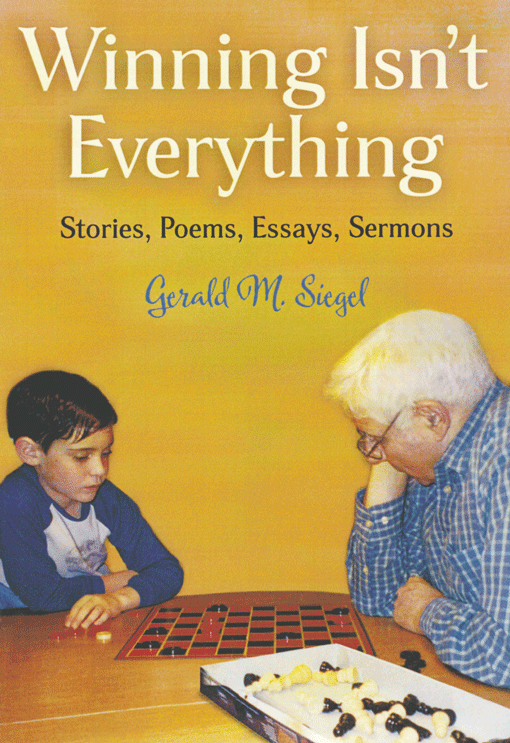Winning Isn’t Everything: Stories, Poems, Essays, Sermons, by Gerald M. Siegel, Morton Publishing trade paperback, 267 pages, $15.95.
Reviewed by NEAL GENDLER
Alternately funny, serious, fanciful and poignant, Jerry Siegel has given us another collection of short pieces of entertaining insight.
Siegel, a retired professor of speech pathology and audiology who never fully cured his tongue of Brooklyn, in 2012 published a series of charming, clever reminiscences about his life and observations called You Shoulda Been There. In Winning Isn’t Everything, we get more, plus stories, sermons and poems written for his four grandchildren — most of them good for reading to anyone’s children or grandchildren.

Among gems: “Our Brooklyn neighborhood was like a small village, and any mischief – or thought of mischief — was broadcast far and wide, eventually ending in my mother’s ears and a different part of my anatomy.”
And why he grew up in a Yiddish-speaking neighborhood but had to learn the language as an adult: “Yiddish was the Mama Loshen (mother tongue) at a time when I was trying to break away from Mama.”
His usual self-effacement appears in a poem about forgiveness:
“To forgive is divine,
So be grateful to me.
My erring alone
Will make a saint of thee.”
Siegel’s tales from years as a handball player includes his realization that it’s time to start wearing glasses: “You can only can go so far in this game by a sense of smell.”
He teaches the game to Rick, a recently discharged Marine 25 years younger and possessed of more energy than skill. Walking the long corridor to the court, Rick dances ahead, then comes back doing jumping jacks. “He’s limbering while I’m lumbering.”
To accommodate an injured group member temporarily forced to play left-handed, the rest of the gang played with the off hand. But two months “of concentrated practice with the left hand was all that young Rick needed to round him out into a fine player. He was getting left-handed kills and fine shots while I was getting bone bruises and shoulder aches. The activity with the left hand seems to have unlocked the previously dormant handball center in the right side of his brain.”
Equally entertaining are some of the divrei Torah — sermons — requested occasionally by his rabbi. Like any good speaker, Siegel knows to get off the stage before people start wishing he would; most are three pages or less. Siegel breezily relates the week’s Torah portion both to serious questions about life and to incidents in his. Enjoyable and meaningful, some raised ideas that hadn’t occurred to me.
For the portion including Korach’s rebellion, Siegel says: “The Book of Numbers that we have been studying is an instruction manual in how to annoy God.” Later, he says the Torah “is the beginning of wisdom, rich with potential for new understandings. … The written words of the Torah are the beginning of a conversation, not its conclusion.”
Troubled by the deaths of the 10 spies who gave a fearful, ill report of the Promised Land, he imagines himself their defense attorney, arguing a pretty convincing case for less severe punishment.
And in one of his best sermons, he expresses a lifelong problem with the Torah commanding us to “remember what Amalek did to you,” followed immediately by a command to “wipe out the remembrance of Amalek from under the heavens, you shall not forget.”
Siegel points out that the commands guarantee that Amalek’s name won’t be wiped out. One of the lessons this teaches “is that having reverence for the Torah means we have to acknowledge and live with its contradictions,” of which there are plenty. He says: “If we don’t question the Torah, we treat it as a relic rather than a living doctrine.”
Winning is a delightful, insightful book of wisdom, often disguised as humor. To borrow his Burma-Shave rhythm:
The sermons are short
But insightful and witty
If you don’t read them all,
It will be a great pity.
***
Neal Gendler is a Minneapolis writer and editor.
Winning Isn’t Everything is available at Elijah’s Cup in St. Louis Park; Micawber’s Books in St. Paul; amazon.com, and siegel@umn.edu
(American Jewish World, 12.20.13)


















